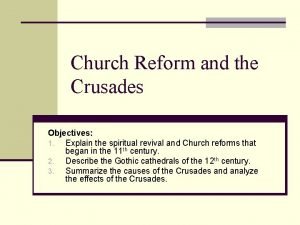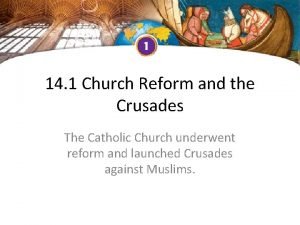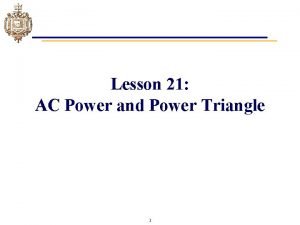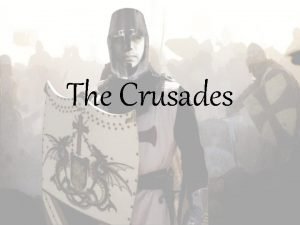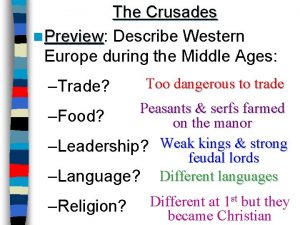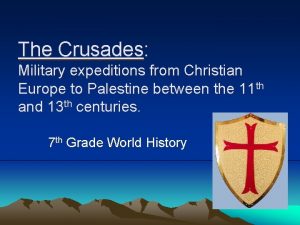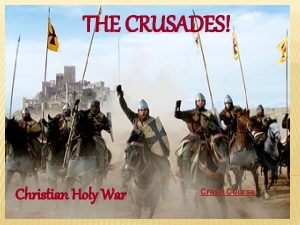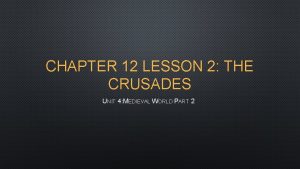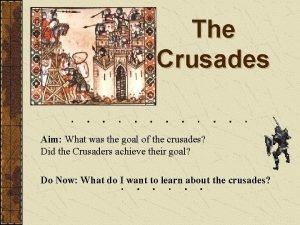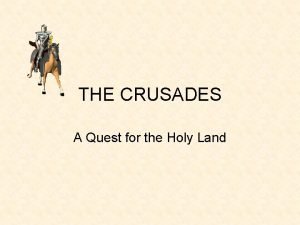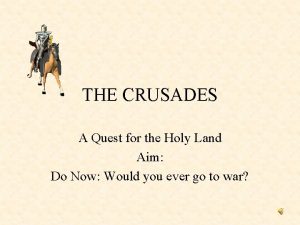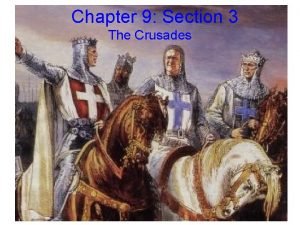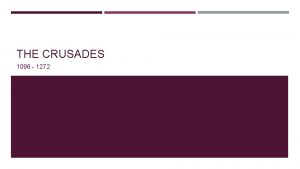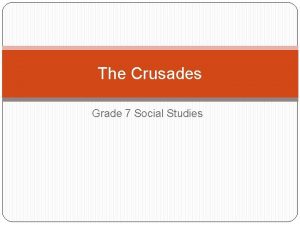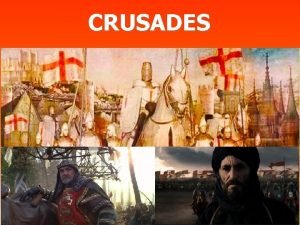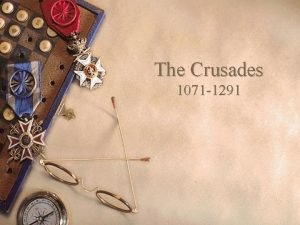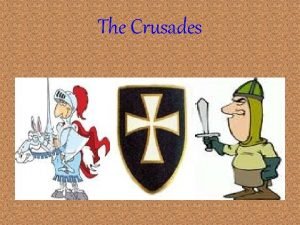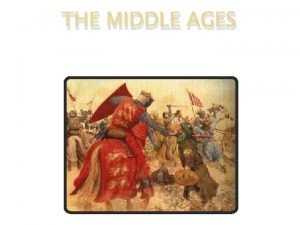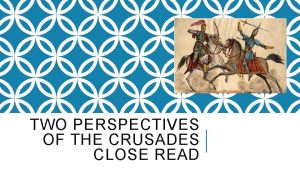The Power of the Church The Crusades Church











- Slides: 11

The Power of the Church &The Crusades


Church Power at its Height In the 1200 s, the Church reached the peak of its power. Two pope’s significantly increased the power of the church. #1 Pope Innocent III established Papal Supremacy He exercised his power over the King John of England when he excommunicated the King and placed his kingdom under Interdict. #2 Gregory VII claimed the right to overthrow kings and Emperors Gregory tried to crown a new emperor when he got into a disagreement with the king of the Holy Roman Emperor. As the church expanded its power, it came into direct conflict with the kings and emperors of Europe.

The Holy Roman Empire The first power struggle unfolded in the Holy Roman Empire between the Emperors and the Pope. Otto the Great was a great ruler of medieval Germany. He formed a close alliance with the church to increase his power. In 962, the pope rewarded Otto by crowning him Emperor of the Holy Roman Empire. The Holy Roman Emperors wanted the power to decide who would become bishops within their kingdoms. This was called Lay investiture. Under this practice, emperors “invested” or presented a bishop with the ring and a staff that symbolized their office.

Emperor vs. Pope Gregory VII banned lay investiture in 1075. This prevented any German Emperors from appointing church officials. This angered the German Emperor, Henry IV, and he ordered that the pope step down from the papacy. Pope Gregory did not listen and instead ordered that Gregory be excommunicated. Henry had no choice and had to beg for the pope’s forgiveness. Henry IV waited in the snow for 3 full days before Pope Gregory finally ended his excommunication. The pope had humiliated the King. In 1122 the church and kings reached a compromise known as the Concordat of Worms. It stated that only the church could appoint a bishop, but the king could veto the appointment.

Trouble in Constantinople In the 1050 s, the Muslim Seljuk Turks invaded the Byzantine Empire. By 1071, the Seljuks had overran most Byzantine lands and had taken control of the Holy Land = Jerusalem and other places in Palestine that Christians believe Jesus lived and preached. Because the Seljuk Turks controlled the Holy Lands, Christians could not take a pilgrimage to the Holy Land. The Byzantine Emperor Alexius I sent an urgent message to Pope Urban II. He requested that Christian knights be sent to help him fight the Turks. The Pope agreed.

Council of Clermont At the Council of Clermont (1095), Pope Urban asked bishops and nobles to take action. “From Jerusalem and the city of Constantinople comes a grievous (troubling) report. An accursed race…has violently invaded the lands of those Christians and has depopulated (killed) them by pillage and fire. ” Urban then asked for a crusade to free the Holy Land: “Both knights and footmen, both rich and poor…must strive to help expel the Seljuks from our Christian lands before it is too late…Christ commands it. Remission (forgiveness) of sins will be granted to those going thither (there). ” Beginning in 1096, thousands of knights were on their way to the Holy Land to fight.

Reasons for the Crusades People joined the crusades for religious, political, and economic reasons. Religious Zeal Many ordinary people were inspired by their faith and wanted to take back the Holy Land. Economic Factors Many knights hoped to win wealth and land from the Crusades, or to escape debt at home. Political Reasons Pope Urban hoped it would increase his power in Europe and maybe mend the schism (split in the Christian church) being fought by knights.


Effects of the Crusades The crusades were a great example of the forceful nature of the church during the Middle Ages. It also had lasting effects on the World. Merchants were able to expand their trade routes into Asia. The failure of the crusades weakened the power of the pope and increased the power of Kings. For Muslims, the intolerance and prejudice displayed during the Crusades left behind a legacy of bitterness and hatred. This legacy continues today. In addition, relationships between Muslims, Jews, and Christians worsened as a result of the Crusades.

The Crusades Timeline You and your partner, will be creating a timeline of the crusades. Step One: Read and Highlight “The Crusades” Handout. You and your partner must read the handout together taking turns reading each paragraph. Step Two: This is a collaborative effort! Each partner will be responsible for work. You must split the events between the two of you! Step Three: Make a timeline of the crusades! You may use your book for extra information. Events you MUST include: 2 nd crusade, Seljuk Turks invade Constantinople, Council of Clermont, 3 rd Crusade, 1 st Crusade, Reconquista, Children’s Crusade, and Inquisition.
 Church reform and the crusades
Church reform and the crusades Chapter 14 section 1 church reform and the crusades
Chapter 14 section 1 church reform and the crusades Draw the power triangle
Draw the power triangle Positives of the crusades
Positives of the crusades How did the crusades change europe
How did the crusades change europe The crusades were military expeditions undertaken by
The crusades were military expeditions undertaken by The crusades crash course
The crusades crash course The crusades were military expeditions undertaken by
The crusades were military expeditions undertaken by Lesson 2 the crusades
Lesson 2 the crusades What were the goals of the crusades
What were the goals of the crusades Crusades recruitment poster project
Crusades recruitment poster project Crusader recruitment poster
Crusader recruitment poster
